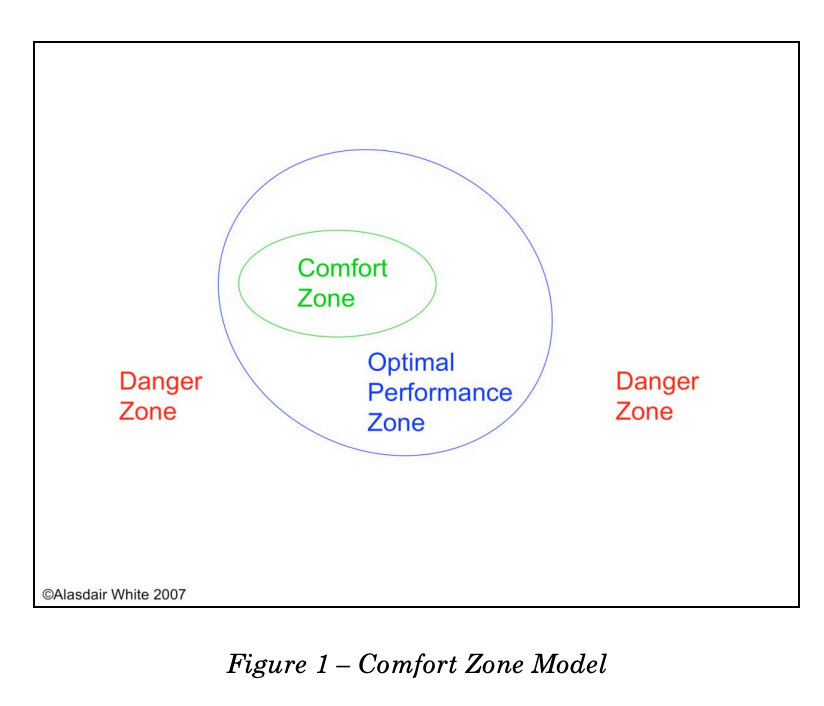While we all deserve to feel at ease here and there, it’s important to acknowledge the dangers of restricting oneself to their comfort zone. Staying in this bubble can encourage controlling behavior, erode one’s ability to adapt to change, and stunt a person’s emotional growth.
Controlling One’s Environment
The comfort zone is a place of consistency. Not much changes; everything can be anticipated, and if something goes amiss, the person is likely prepared for the situation, because they’ve had the space to plan for it.
In a study where participants were assigned an activity outside of their comfort zone, the researchers found that participants who completed such an activity (compared to those who were assigned a control condition) experienced a boost in life satisfaction, even though they were relatively less happy at baseline (Russo-Netzer, Cohen).
Say you’re contemplating Friday night plans. Your go-to is to order in and binge your favorite show, but your old friend is in town and wants you to come out to the bar. Instantly you think “What if I see this person?” or “What if someone tries to hit on me?” or “I’ve been sober for a year, how do I tell my friend that I don’t go to bars anymore?”
Suddenly, you find yourself combating each thought: “If I see this person, I’ll just take a phone-call and say I have to leave right away” or “I’ll wear this fake diamond ring on my ring finger so that no one hits one me” or “I’ll just say I’m not feeling well and that you’ll see them next time.” And so on and so on until every situation is planned for. Except maybe the guy at the bar doesn’t care that you’re married, or maybe your friend shows up to your apartment with booze when you say you don’t feel like going out. The possibilities are infinite, and we simply cannot plan for all of them.
The alternative? Stay home where you’re safe, where you don’t need to make any excuses or plan any exit strategies. Stay home and miss the opportunity to meet someone new, or to be honest and vulnerable with someone.
The alternative to the alternative? Go. Set yourself a small milestone, even if that’s just “go out for an hour.” Give yourself the opportunity to adapt to your environment, rather than trying to control it.

Adapting to Change
Outside of the comfort zone, quite literally anything could happen. For someone already coping with mental illness, this uncertainty usually invites predictions about the worst case scenario, which further roots that person in their comfort zone. The problem is that without uncertainty, every scenario can be planned for, and neglected is the muscle that encourages people to think on their feet, take chances, and adapt to their environment.
Ok – so we don’t adapt to our environment. Now what? Maybe our relationships suffer, maybe we fall out of touch with what matters to us, maybe we live our lives in fear. Our environment stays the same – safe and consistent – while the world grows around us.
Stunted Growth
Staying in your comfort zone is pretty much like getting in your own way. Everyone is capable of growing, but one sure way to stunt growth is to cling to safe, consistent environments. When your first response to an ambiguous situation is to try to control it, you immediately lose out on an opportunity to strengthen your adaptability. As Alasdair White says in From Comfort Zone to Performance Management, “the objective is to push or lead the [person] into the optimal performance zone so that their skills are increased and become comfortable with the level of anxiety, thus enabling them to consistently deliver an increased level of performance.”
Over time, as you remain in the comfort zone, your ability to adapt to change or anxiety dissipates, and your reactions to unstable conditions can become more erratic and anxiety-inducing. These events and conditions can become even more triggering, and not only stunt your growth, but even cut it back.
Where there is consistency, there is inconsistency, because the world as it really is is inconsistent. To stay in one’s comfort zone for any amount of time is only to delay their relinquishing of control.
Relinquishing Control & Stepping Outside of Your Comfort Zone
Stepping outside of your comfort zone and relinquishing control often go hand and hand. There are infinite ways to do this, but if you’re looking for an entry point, start small and talk big.
By setting yourself a small goal, you’re setting yourself up for success. For one, the goal is relatively low risk, and high reward (because any reward is BIG! You DID it!). Say you text back that friend and tell them you can only meet them for an hour, order a soda, and do just that! Will those same unwelcome thoughts come to mind? Probably. How are you going to respond to them? By reminding yourself that you’ll never be able to control the variables around you, but the one thing you can control is how you respond to them. Don’t believe yourself? Doesn’t matter. You’d be surprised how, over time, you can trick your brain into believing you. Talk big.
“As people adapt to new realities of their situation, they expend significant amounts of energy on finding ways of making things work… This boosts self-esteem.. [and] people are willing and able to do what is asked,” (White).
Comfort zones, like most things, are fine in moderation, but building a habit out of comfort will only work against you. Facing discomfort allows a person to surrender to their environment, adapt to it, and grow from the experience. You owe yourself as much as to take care of yourself and give yourself room to grow. If you see that your plant’s roots are suffocating in its pot, do you not get it a bigger pot in which to thrive?
~ Elaine Menshoff

Hi ![]() my name is Elaine. I’m a first generation American with a passion for the arts and for helping people. My interest in mental health started with my own journey into therapy, and grew as began working for a mental healthcare company geared toward making therapy more affordable and accessible. When I’m not working my day job, you’ll find me painting, writing, or enjoying quality time spent with my loved ones!
my name is Elaine. I’m a first generation American with a passion for the arts and for helping people. My interest in mental health started with my own journey into therapy, and grew as began working for a mental healthcare company geared toward making therapy more affordable and accessible. When I’m not working my day job, you’ll find me painting, writing, or enjoying quality time spent with my loved ones!
Sources:
White, Alasdair (2009 ‘From Comfort Zones to Performance Management’, White & Maclean
Pninit Russo-Netzer & Geoffrey L. Cohen (2022) ‘If you’re uncomfortable, go outside
your comfort zone’: A novel behavioral ‘stretch’ intervention supports the well-being of
unhappy people, The Journal of Positive Psychology, DOI:
10.1080/17439760.2022.2036794

